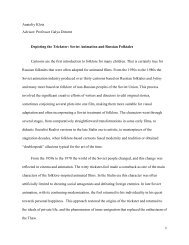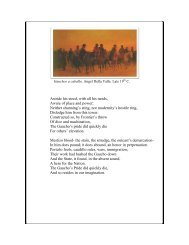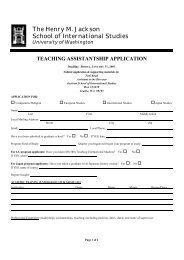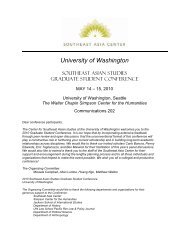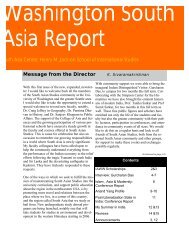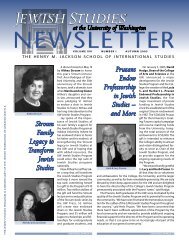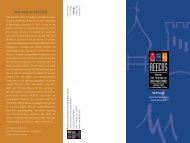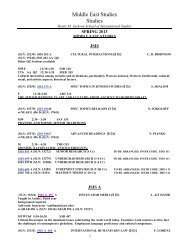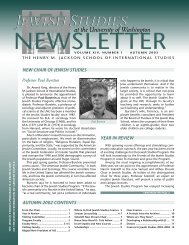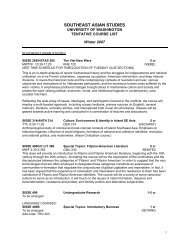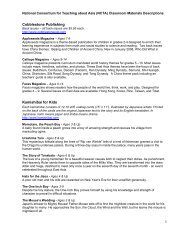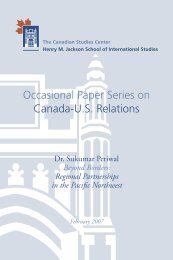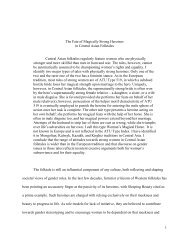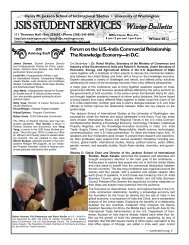Russia East European Studies Courses - Jackson School of ...
Russia East European Studies Courses - Jackson School of ...
Russia East European Studies Courses - Jackson School of ...
Create successful ePaper yourself
Turn your PDF publications into a flip-book with our unique Google optimized e-Paper software.
RUSSIAN / EAST EUROPEAN / CENTRAL ASIAN STUDIES COURSES<br />
WINTER QUARTER 2013<br />
For descriptions not included in this list, go to: http://jsis.washington.edu/ellison/ or<br />
http://www.washington.edu/students/crscat/ or view instructor’s course description, linked to the course in the Time<br />
Schedule. Changes to schedule are posted at Winter Time Schedule website:<br />
http://www.washington.edu/students/timeschd/Win2013/<br />
ENTRY CODES FOR JSIS COURSES are available in Thomson 111. Students not attending class first week <strong>of</strong> the<br />
quarter may be dropped.<br />
GRADUATE STUDENTS NOTE: 200 and 300 LEVEL COURSES do not count towards graduation requirements<br />
unless they are approved by the chair <strong>of</strong> the REECAS program and the course instructor.<br />
ANTHROPOLOGY<br />
AREA STUDIES<br />
ANTH 425 Anthropology <strong>of</strong> the Post-Soviet States (5)<br />
Students will learn anthropological perspectives on Soviet and post-Soviet life from readings <strong>of</strong> studies based on<br />
ethnographic fieldwork. We will explore what "Sovietness" was, how it was experienced in everyday life, and the<br />
particularities <strong>of</strong> post-Sovietness in comparative cross-cultural perspective. We will examine how politics impinged on<br />
people's sense <strong>of</strong> culture, language, and identity; the role <strong>of</strong> economics in interpersonal relations and social power; how<br />
history has been variously reinterpreted and used to define and justify the present. We will examine how people<br />
experience and participate in the construction <strong>of</strong> social divisions such as class, gender, language, and ethnicity, and<br />
how these have been transformed with the formation and demise <strong>of</strong> the Soviet system. Offered jointly with JSIS A 427.<br />
Bilaniuk, Laada<br />
TTh 130-320 MEB 235<br />
ANTH 526 Political Islam and Islamic Fundamentalism (3/5)<br />
Examines political Islam as a modern phenomenon produced at the intersections between localized and globalized<br />
political cultures and between political, religious, and social authority. Focuses on anthropological studies to examine<br />
how Islamic publics produce moral judgments about political practices. Offered jointly with JSIS B 526.<br />
Robinson, Cabeiri<br />
INTERNATIONAL STUDIES<br />
M 130-420 THO 215<br />
JSIS 489 Security in the Black Sea Region (5)<br />
The security situation in a wider Black Sea area (which is <strong>of</strong>ten seen as something broader than just a security <strong>of</strong> a<br />
Black Sea basin) has undergone a lot <strong>of</strong> transformations in the recent 20 plus years since the end <strong>of</strong> the Cold war. With<br />
dissolution <strong>of</strong> the <strong>East</strong>ern bloc and Soviet Union the region has seen an influx <strong>of</strong> new players. This new diversity <strong>of</strong><br />
actors has also been met by an increased role <strong>of</strong> various international groupings – EU, OSCE, NATO, BSEC, GUAM<br />
and more. The security situation here is a dynamic one, where one can see a tendency to cooperate coupled with some<br />
strong competing trends and even a potential for confrontation. The break up <strong>of</strong> the Soviet Union has left the region with<br />
a bunch <strong>of</strong> the so-called "frozen conflicts", which are not frozen really and all are currently far from their final resolution.<br />
The Black Sea area has seen a wide array <strong>of</strong> security concerns ranging from more traditional "hard" ones (which was<br />
most vividly demonstrated by the 2008 war between <strong>Russia</strong> and Georgia) to the once unconventional "s<strong>of</strong>t" ones that do<br />
include the issues <strong>of</strong> energy and environmental security, the problems <strong>of</strong> migration, trafficking in humans, weapons and<br />
drugs, socio-economic underdevelopment, lapses in democracy, human rights and good governance and much more.<br />
Thus the regional security complex provides with us with a rich material to be studied.<br />
TBA,<br />
12/12/2012<br />
MW 1130-120 DEN 217<br />
Page 1 <strong>of</strong> 5
JSIS 495 F Task Force: US Relations with <strong>Russia</strong>: Bilateral Issues and Global Impact (5)<br />
The purpose <strong>of</strong> this course is to allow students to simulate membership in a Presidential Advisory Com¬mission on U.S.<br />
relations with <strong>Russia</strong>. After a brief review <strong>of</strong> academic and policy research literature in the first two weeks, students will<br />
appoint a chairperson, who will be responsible for setting up sub-commissions on four aspects <strong>of</strong> U.S.-<strong>Russia</strong>n<br />
relations and their global impacts: 1) security/arms control, which will review the status <strong>of</strong> bilateral cooperative efforts<br />
and disagreements in the area <strong>of</strong> international terrorism, weapons <strong>of</strong> mass destruction, and bilateral and multilateral<br />
arms control; 2) trade prospects and constraints, particularly approval <strong>of</strong> <strong>Russia</strong>'s accession to the World Trade<br />
Organization and the need for revision <strong>of</strong> the <strong>Jackson</strong>-Vanik amendment; 3) regional conflicts in the "Near Abroad," and<br />
the Middle <strong>East</strong>, and the possibilities <strong>of</strong> harmonizing U.S. and <strong>Russia</strong>n policies; and 4) human rights practices in<br />
<strong>Russia</strong>, and the impact <strong>of</strong> the war in Chechnya on U.S.-<strong>Russia</strong>n relations. Small-group seminars address current<br />
problems in international affairs, each focusing on one specific policy question and producing a joint task force report.<br />
Restricted to senior majors in International <strong>Studies</strong>. Prerequisite: JSIS 200; JSIS 201; JSIS 202; JSIS B 330.<br />
Huber, Robert<br />
JSIS 498 Democracies and the Interantional Security System (5)<br />
Readings for this examination <strong>of</strong> recent scholarship on the relationship between domestic political systems and<br />
international security begin with William McNeill’s classic The Pursuit <strong>of</strong> Power (1981) which explains the military<br />
dimensions <strong>of</strong> “the rise <strong>of</strong> the West.” Then David Deudney’s Bounding Power: Republican Security Theory from the<br />
Polis to the Global Village (2007). James Huntley, David Hendrikson, John Ikenberry, Charles Kupchan have also<br />
recently published deeply historical analyses <strong>of</strong> the long-term trajectory <strong>of</strong> today’s liberal international system. Students<br />
will choose among these texts, each <strong>of</strong> which includes an examination <strong>of</strong> the relationship <strong>of</strong> a hegemonic American<br />
federation to other global power centers. The course will end with a choice <strong>of</strong> readings including Martin Jacques, When<br />
China Rules the World” (2010); Mark Leonard’s Why Europe Will Run the 21st Century (2007); Kenneth Pyle’s Japan<br />
Rising: The Resurgence <strong>of</strong> Japanese Power and Purpose (2008); and selected readings on USSR/<strong>Russia</strong>n Federation.<br />
Radnitz, Scott<br />
JSIS A 427 Anthropology <strong>of</strong> the Post-Soviet States (5)<br />
See ANTH 425 for course description. Offered jointly with Anthropology.<br />
Bilaniuk, Laada<br />
TTh 130-320 MEB 235<br />
JSIS A 430 Security Affairs <strong>of</strong> <strong>Russia</strong> & Eurasia (5)<br />
Surveys history <strong>of</strong> Soviet military and Soviet empire from 1917 to 1985, breakup <strong>of</strong> the USSR during 1985 to 1991, and<br />
the emergence <strong>of</strong> new security issues among those Eurasian states that formally constituted the national components<br />
<strong>of</strong> the USSR and its communist military allies. Survey <strong>of</strong> the creation and collapse <strong>of</strong> the Soviet security system for<br />
<strong>East</strong>ern Europe from 1945-1990. Interaction <strong>of</strong> the Warsaw Pact and NATO. Collapse <strong>of</strong> the Soviet military and USSR,<br />
1989-1991. <strong>Russia</strong> and <strong>European</strong> security after 1991.<br />
Jones, Christopher<br />
JSIS A 479 Contemporary Central Asia Politics (5)<br />
Examines the politics <strong>of</strong> contemporary post-Soviet Central Asia. Analyzes issues relevant to the region in comparative<br />
perspective, including democratization, religion, terrorism, civil society, economic reform, ethnic identity, and<br />
international influences. Uses theory to shed light on current policy debates. Offered jointly with SISRE 579-A and POL<br />
S 579.<br />
Radnitz, Scott<br />
JSIS A 515 Thesis Seminar (2)<br />
The purpose <strong>of</strong> this seminar is to guide Master's students <strong>of</strong> the <strong>Russia</strong>n <strong>East</strong> <strong>European</strong>, and Central Asian <strong>Studies</strong><br />
program toward the timely and successful completion <strong>of</strong> their MA theses. Course meetings will be focused primarily on<br />
student presentations and peer feedback, but the instructor will also intervene when this seems useful and appropriate.<br />
Each student will be responsible for completing three assignments: an Each student will be responsible for completing<br />
three assignments: an initial "thesis statement" (usually your intro chapter/section) and basic bibliography <strong>of</strong> sources to<br />
be consulted, including sources in the language(s) <strong>of</strong> the REECA region; an outline <strong>of</strong> the entire MA thesis along with a<br />
chapter; and, finally, a completed draft <strong>of</strong> the thesis itself. Required <strong>of</strong> all second-year MAIS students.<br />
Mikkelsen, Marta<br />
12/12/2012<br />
Page 2 <strong>of</strong> 5
SLAVIC LANGUAGES & LITERATURES<br />
CZECH 420 Modern Czech Literature in English (5)<br />
Caught between <strong>East</strong> and West, modernity and tradition, Slav and <strong>European</strong> identity, the country today known as the<br />
Czech Republic has produced some <strong>of</strong> the most vital, moving and irreverent literature in the world. This course will<br />
serve as a general introduction to modern Czech literature and film, focusing mostly on post-1918 works. We will pay<br />
special attention to the role 20th-century history and national tragedy have played in Czech culture, as well as how<br />
authors deploy humor and sex as a strategy <strong>of</strong> resistance, survival and celebration. In addition to reading novels and<br />
shorter pieces by Karel Capek, Bohumil Hrabal, Milan Kundera, Ivan Klima and others, we will also watch films by Jiri<br />
Menzel, Vera Chytilov and Jan Sverak. The course concludes with a discussion <strong>of</strong> the current, post-socialist state <strong>of</strong><br />
Czech literature, film and popular culture.<br />
Alaniz, Jose<br />
RUSS 322 <strong>Russia</strong>n Literature & Culture 1840-1917 (5)<br />
This course covers the literature and culture <strong>of</strong> mid nineteenth-century <strong>Russia</strong> until the fall <strong>of</strong> Tsarist power in 1917.<br />
During this period, <strong>Russia</strong> assimilated all it had borrowed from the West, turned it into a sophisticated modern <strong>Russia</strong>n<br />
culture, and returned it to the West as a new and exciting inspiration. The literature studied will include works <strong>of</strong><br />
<strong>Russia</strong>n prose, poetry and drama, with some attention paid to visual art, historical context and intellectual history.<br />
Diment, Galya<br />
MWTh 1030-1120 Plus T quiz section<br />
RUSS 512 <strong>Russia</strong>n Literary Criticism (3)<br />
A study <strong>of</strong> critical positions, problems, and literary values <strong>of</strong> major <strong>Russia</strong>n literary critics from Belinsky to the present.<br />
West, James<br />
RUSS 570 Caucasus in <strong>Russia</strong>n Literature (5)<br />
Working in consultation with a faculty adviser, students formulate a topic and prepare a 30-minute oral presentation to<br />
be delivered at the seminar and submit a written paper to be read and critiqued. by all participants.<br />
Lominadze, Aida<br />
LANGUAGES<br />
NEAR EASTERN LANGUAGES & CIVILIZATIONS<br />
TKIC 415 Introduction to Kazakh (3)<br />
Position <strong>of</strong> Kazakh within the community <strong>of</strong> other Turkic languages; alphabets used for Kazakh; reading <strong>of</strong> texts from<br />
Kazakhstan and China (Xinjiang); oral and written exercises. Cannot be taken for credit if 402 taken. Second in a<br />
sequence <strong>of</strong> three.<br />
Mawkanuli, Talant<br />
SCANDINAVIAN STUDIES<br />
LATV 202 Second Year Latvian (5)<br />
Intensive practice in speaking, reading, and writing. Functional review <strong>of</strong> grammar. Recommended: LATV 103.<br />
Grinberga, Iveta<br />
SLAVIC LANGUAGES & LITERATURES<br />
BCS 402 Elementary Bosnian/Croatian/Serbian (5)<br />
Comprehensive introduction to spoken and written literary Croatian and Serbian. Prerequisite: CR SB 401.<br />
Belic, Bojan<br />
12/12/2012<br />
Page 3 <strong>of</strong> 5
BCS 405 Second Year Bosnian/Croatian/Serbian (5)<br />
Continuation <strong>of</strong> 401, 402, 403; reinforces basic grasp <strong>of</strong> language and enlarges both vocabulary and command <strong>of</strong><br />
grammatical patterns through the reading <strong>of</strong> contemporary short stories both Croatian and Serbian. Prerequisite: 2.0 in<br />
CR SB 403.<br />
Belic, Bojan<br />
CZECH 402 Elementary Czech (5)<br />
This three-term sequence (401-402-403), running from Autumn through Spring, is intended as an intensive introduction<br />
to the Czech language. Because <strong>of</strong> the small size <strong>of</strong> the classes, courses move at a faster pace than the normal<br />
introductory language sequence. The general objective is that at the completion <strong>of</strong> the one-year sequence students<br />
should be able to be creative with the language at the sentence level, handle basic everyday life situations, read simple<br />
connected texts dealing with basic personal and social needs, write short simple letters, postcards, diary entries, take<br />
down simple notes (e.g., phone messages), etc. The goal is to move from Novice to Intermediate Low/Mid level on the<br />
ACTFL Pr<strong>of</strong>iciency Scale. Prerequisite: CZECH 401 or permission <strong>of</strong> instructor.<br />
Soldanova, Jaroslava M.<br />
CZECH 405 Second Year Czech (5)<br />
The second-year sequence in Czech language is designed as a completion <strong>of</strong> the formal study <strong>of</strong> the grammar <strong>of</strong> a<br />
language, supplemented by extensive readings from a variety <strong>of</strong> areas, emphasizing cultural and ethnic heritage.<br />
Emphasis is placed upon oral and compositional skills. The student is expected to write brief reports and to prepare oral<br />
classroom presentations. Prerequisite: 404 or permission <strong>of</strong> instructor.<br />
Soldanova, Jaroslava M.<br />
POLSH 402 First Year Polish (5)<br />
Principal morphological and syntactic features <strong>of</strong> the Polish language through the medium <strong>of</strong> a basic vocabulary.<br />
Prerequisite: POLSH 401. Offered Winter quarter every other year (odd numbered years, e.g. 2009, 2011).<br />
Dzirwirek, Katarzyna<br />
RUSS 102 First Year <strong>Russia</strong>n (5)<br />
Introduction to <strong>Russia</strong>n. Emphasis on oral communication with limited vocabulary. Short readings and writing exercises.<br />
Basic grammar. Conducted mostly in <strong>Russia</strong>n. See credit note above. Prerequisite: RUSS 101.<br />
Zaitseva, Valentina<br />
RUSS 202 Second Year <strong>Russia</strong>n (5)<br />
Comprehensive review <strong>of</strong> <strong>Russia</strong>n grammar with continuing oral practice and elementary composition. Conducted<br />
mostly in <strong>Russia</strong>n. See credit note above. Prerequisite: RUSS 201.<br />
Zaitseva, Valentina<br />
RUSS 302 Third Year <strong>Russia</strong>n (5)<br />
Extensive practice in spoken and written <strong>Russia</strong>n based on a variety <strong>of</strong> prose readings. Intensive review and<br />
supplementation <strong>of</strong> strategic grammatical concepts. Prerequisite: RUSS 301.<br />
Polack, Zoya<br />
RUSS 402 Advanced <strong>Russia</strong>n (5)<br />
The fourth-year program in <strong>Russia</strong>n (RUSS 401-402-403) begins the analysis <strong>of</strong> styles in the literary language.<br />
Readings are chosen from a variety <strong>of</strong> classical and contemporary works, from belles-lettres and poetry, and from<br />
journalism and non-artistic prose. Attention is especially paid to syntax, particularly the composition <strong>of</strong> compound and<br />
complex sentences and peculiarities <strong>of</strong> word order. Rhythm and intonation are stressed in oral recitation. One day per<br />
week is devoted to developing advanced written comprehension and translation skills. Prerequisite: RUSS 401 or<br />
permission <strong>of</strong> the instructor.<br />
Polack, Zoya<br />
12/12/2012<br />
Page 4 <strong>of</strong> 5
RUSS 451 Structure <strong>of</strong> <strong>Russia</strong>n / Synchronic Slavic Linguistics (5)<br />
The major goal <strong>of</strong> the course is to improve the student's understanding <strong>of</strong> the building blocks <strong>of</strong> <strong>Russia</strong>n. We briefly<br />
look at different approaches to description <strong>of</strong> the language, but the primary approach is descriptive. This course<br />
examines: 1) The phonetics <strong>of</strong> standard literary <strong>Russia</strong>n in contrast to the major geographical divisions as well as<br />
pronunciation in various social stratifications, 2) the phonological system <strong>of</strong> <strong>Russia</strong>n including both automatic<br />
alternations and morphophonemic ones, 3) the morphology <strong>of</strong> the language with special attention to word derivation and<br />
the influence <strong>of</strong> Old Church Slavonic and other languages on the modern lexicon. There is a midterm, a final and a<br />
written project. The textbooks may vary depending on their availability. Prerequisites: RUSS 303 & LING 200. Crosslisted<br />
with SLAV 550.<br />
Augerot, James<br />
RUSS 502 <strong>Russia</strong>n Translation (3)<br />
Introduction to the theory <strong>of</strong> translation; translation to and from <strong>Russia</strong>n <strong>of</strong> selected prose passages in a variety <strong>of</strong><br />
styles, with emphasis on idiomatic accuracy and stylistic compatibility. Prerequisite: two quarters <strong>of</strong> RUSS 501 or<br />
permission <strong>of</strong> instructor.<br />
West, James<br />
SLAV 490 Georgian Language (3-5)<br />
Introductory exposure to the Georgian culture, history, arts, and literature through the study <strong>of</strong> Georgian language. The<br />
course teaches all four skills - listening, speaking, reading and writing. The instructor teaches the language in the<br />
context <strong>of</strong> Georgian folklore, poetry, literature, history, fine arts, and current geopolitical events. One third <strong>of</strong> the class is<br />
devoted to lectures, the remaining period includes discussions and 'hands-on' learning <strong>of</strong> the language and culture. This<br />
course is taught entirely in <strong>Russia</strong>n. Prerequisite: RUSS 303. Cross-listed with SLAV 570.<br />
Lominadze, Aida<br />
SLAV 570 Georgian Language (3-5)<br />
See SLAV 490 for course description. Offered jointly with SLAV 490.<br />
Lominadze, Aida<br />
SLVN 402 Introductory Slovene Language (3/5)<br />
Introduction to spoken and written Slovene language. Second in a two course sequence. Prerequisite: SLVN 401.<br />
Biggins, Michael<br />
12/12/2012<br />
Page 5 <strong>of</strong> 5



